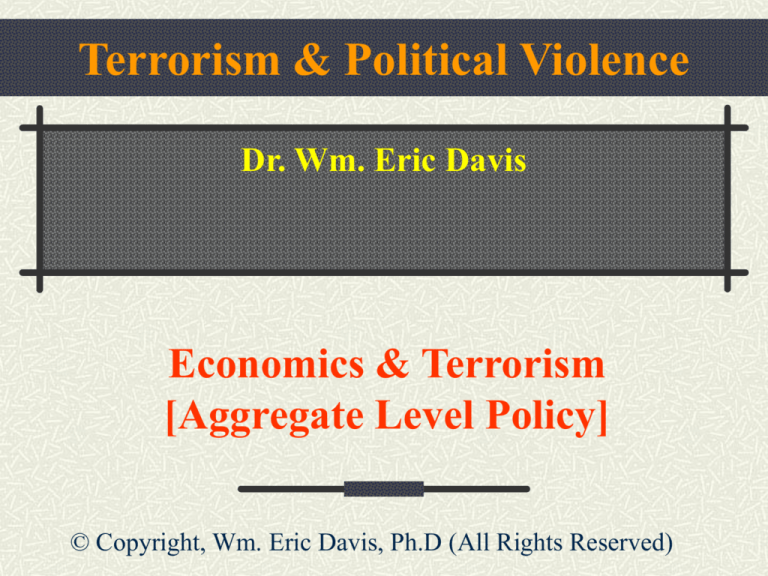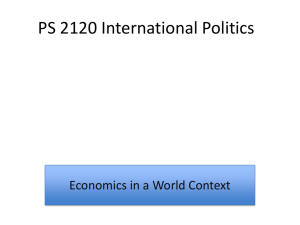
Terrorism & Political Violence
Dr. Wm. Eric Davis
Economics & Terrorism
[Aggregate Level Policy]
© Copyright, Wm. Eric Davis, Ph.D (All Rights Reserved)
Gross Domestic Product [GDP]
The total value of all goods and services
produced within a nation (including
foreign owned companies).
Dividing this amount by the population
gives you the per capita GDP.
2
US GDP (1940-2000)
Per Capita GDP
“Comparative Advantage”
Comparative advantage means each nation (or state)
exploits the sector of an economy in which it has an
advantage.
Some nations (or states) are rich in natural resources
(like the US), some are rich in labor supply (China
& India), while others are rich in technology, etc.
Comparative Advantage means you do not attempt to
compete in each and every sector of the economy,
but just in the one (or two) and leave other sectors
to other nations so that they can develop (and
presumably become peaceful).
5
“Export Oriented Growth”
A nation that is poor in raw natural resources imports raw
materials from other nations and turns them into finished
products.
It then exports them to other nations, often the nation that
provided the raw resources in the first place. It allows poor
nations to develop economically, but it requires that they be
interdependent with other nations (not dependent,
hopefully)
6
“Dependency Theory”
A theory popular in Latin America (and other
regions) in the 1970s which asserted that a
wealthy nation’s prosperity is based on the
exploitation of third world nations.
It is basically Marxist theory on an international
scale.
7
How Dependency Theory Explains World Economics
8
The Mechanics of Dependency Theory
Focuses on relationships among nations rather than changes within a
nation.
Relies on Marxist Framework of explanation (i.e., “class” differences).
Asserts that the modernization of the West came (and still does) at the
expense of other nations.
Theory originated out of 16th century patterns of relations in which
certain nations were able to exploit others (i.e., colonialization).
Empirical tests of the theory fail to establish its validity. Responsible for
the most spectacular international bankruptcies of the 20th century
(USSR, Eastern Europe, Latin America, Africa, and parts of Asia).
Zimbabwe and Venezuela today have again fallen under its spell).
9
World Prosperity
“Import Substitution”
This idea became popular in Latin America and Africa
in the 1970s. It means a nation creates domestic
substitutes for all imported products. [It does not use
the comparative advantage or export-oriented growth
strategies].
Basically, a nation will try to make its own cars,
refrigerators, and so forth, while cutting itself off
from the world economy (however, other countries are
welcome to buy their products, but not vice versa).
It was a disastrous policy for nations that implemented
it, especially in Latin America.
11
Protectionism in America
In the 1980s, many Americans became concerned about
Japanese competition in the American marketplace.
One political party (the Democrats) responded by
proposing protectionist legislation (which is essentially
import substitution) to try and protect American jobs.
Today, the Democrats are still opposing free trade
agreements between the U.S. and other countries
(such as the recent one with Colombia). They want to
“renegotiate” the North American Free Trade
Agreement (NAFTA). They would get rid of it if they
could, eliminating the basis for world prosperity.
12
Globalization (Interdependence Theory)
1.
Nations establish stable trading patterns in which each
country conforms to the rules of “comparative advantage.”
2.
Allows poor countries to develop, although not necessarily at
the same rate as more developed countries.
3.
Promises peace among nations (why attack a nation if your
own economy is intertwined with it?)
4.
The political left fears it will entrench the developed nations
at the top of a world economic hierarchy and that it will lead
to cultural imperialism of Western values.
13
Fears from Globalization
Fears of Multinational Corporations
The Loss of Good Paying Jobs ?
How Far Can it Go?
Should You be Concerned?
Okay, Maybe Getting Carried Away
Fear or Irrational Panic?
Americans’ fear of jobs going overseas is again on the rise
In the 1980s, Americans were alarmed by the
changing nature of world economics and
were concerned that the US had entered
irreversible economic decline, which would
negatively affect our influence in deterring
violence and advancing human rights.
Japan was a specific target of our fears. Should
the US have been so concerned? In the 1990s,
Asia went into a decade long recession.
But Can other Countries Make a Better One of These?
A Little Something for the Ladies Too
(So I don’t get accused of discrimination)
Should we Send Manufacturing jobs to the Middle East?
Will greater economic development there
eliminate a source of grievances (poverty)
and accordingly reduce terrorism?
Arab states oppose globalization because it
will increase US influence in the region
(especially in terms of values).
Is Economics Relevant to Terrorism?
Is attempting to improve economics among poor
states going to be effective in reducing
terrorism?
Is economics really what is motivating terrorism
by America’s enemies?
If not, then what will it take? Will it take a
cultural approach (that is, to change middle
eastern culture).
What Distinguishes the West
A Strong Sense of Individualism and the Importance of Life.
Among other things, and culturally speaking, the West elevates
life over concerns of dignity or honor. [Gangs and the Mafia
are an exception].
Most of Europe has eliminated the death penalty.
The US has a death penalty, but only for the most heinous of
murderers, the justice system is biased in favor of the
defendant, and there are lots of appeals opportunities. Even
so, se rarely sentence people to death and even more rarely
carry it out.
Opposing Values
In many parts of the world, including the middle east,
dignity and honor (and virtue) are considered more
important than life (certainly more important than
other people’s lives).
“Honor Killings”
Blood Feuds
Gangs and Mafia (where respect is demanded)
Japan used to be this way (Hari Kari).
“Religious Police”. (Sharia, rights of women, etc).
This cultural distinction may explain the
quick resort to violence in many parts of
the world.
It is a cultural explanation.
Cultural Economics
Maybe we need to combine economics and
culture into a single (multi-dimensional)
approach to addressing terrorism and
political violence.
They both play a role, although it can be
argued how strong a role each plays.








